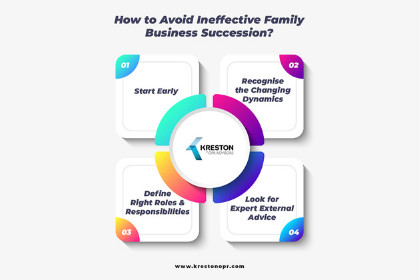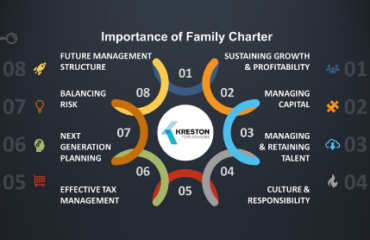
Smart succession planning is key to the future of a family business. When handing the reins of a family business to the next generation, you need an actionable plan and even professional help to secure the future of your business. Succession planning is all about asking the right questions and preparing the next generation for the challenges ahead. The future may be unknown and a lot of business aspects are not in the control of a business leader planning his succession. And yet it is possible to plan a smooth transition of business leadership in a family business.
Difficulties in Succession Planning
Handing over the baton in a family business is riddled with difficult decisions and therefore, it needs to be a well-thought-out process to be successful. Some of the common concerns in succession planning are –
- Timely Planning – Business owners tend to be heavily invested in the day to day business operations without taking the time to define a vision for the future of the business and begin succession planning. Research suggests that almost half of the family businesses don’t think about succession planning until it is too late.
- Adapting Vision / Execution – For a succession plan to succeed, the business owner may need to alter the vision that they have carried for their business for decades. They need to find consonance with the next generation’s vision for the business and adapt to the new possibilities and ideas.
- Natural successors unwilling / under-qualified – In many cases, business owners find that the members of the younger generation are unwilling to participate in the business, do not want to assume leadership, or they are incompetent or unskilled to run the business.
Despite the above-stated pain points in succession planning, as long as the focal point of the exercise is to identify and groom the potential leaders for key roles in the business – your succession planning can be seamless and hassle-free. It also helps the employees and non-family investors remain confident about the future of the company once the leadership changes.
How to Create a Reliable Business Succession Plan
Here are some important steps to take when creating a reliable business succession plan –
- Collecting Information & Valuation: The first step in creating a succession plan is to ensure a firm financial footing for the next generation. Collate information about on-going contracts, financial data, and legal information about your business. It is also important to conduct a valuation of the business assets and debts to understand the business’ financial condition.
- Planning: Understand the stakes in the business by different family members, and think about the roles and responsibilities that the various family members will assume in the future. Develop an action plan for different contingencies according to this. This will help in protecting the business interest in case adverse circumstances arise in the future.
- Reorganize the Business: In some cases, future planning may reveal the need for reorganizing the business hierarchy, operations, finances, or a complete top-down restructuring. This is a great step to start involving the next generation, the potential successors – inthe transition, and to push them to drive the restructuring.
- Sort Contractual Obligations: If there are any on-going contractual obligations by the business, to be honored by the future generations – collate and provide all the necessary information to them to ensure that contracts are carried on through the generations.
There is no doubt that succession planning and transition of leadership in a family business is a difficult process. It calls for asking tough questions and facing uncomfortable conversations on delicate issues. However, if you approach the succession plan with a holistic mindset and a thorough understanding of your business, your future strategy, and the next generation’s point of view – you could create a solid succession plan.



